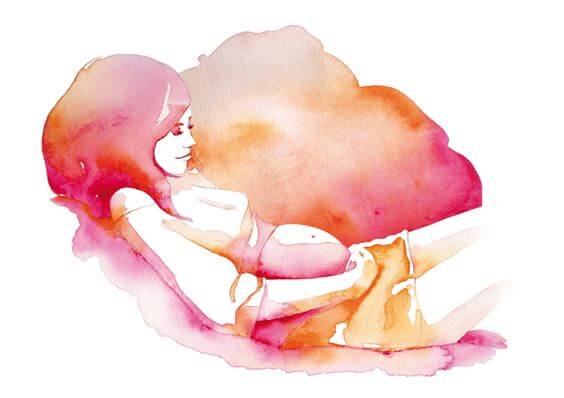Giving Birth: A Woman's Greatest Act of Love

It is often said that giving birth is like a blind date where, finally, the mother will get to know the one who will be the love of her life. There are few acts, like childbirth, that are at the same time painful, sacred and full of incredible emotions. It is indeed a crucial moment, and one which requires a very special treatment. If conception was an act of love, giving birth should be equally as warm and loving.
Around the middle of May each year the World Week for a Respectful Birth is celebrated. One fact that we must take into account and which WHO (The World Health Organization) warns us about, is that in the last few decades many women have complained that sometimes there is too much protocol associated with childbirth, and that it is not very caring and sometimes even traumatic.
There is no pain more intense than that of a childbirth, nor a love as deep and pure as that of a mother towards that newborn child that she has just brought into the world.
Nils Bergman is a pediatrician and neonatologist known especially for his studies in perinatal neuroscience. According to him, one of the most important moments to build an appropriate bond of attachment between the mother and child is undoubtedly the “first thousand minutes of life.” If the mother and the child feel excessive stress, all of this could affect the quality of that first emotional imprint on the newborn.
A child’s arrival into this world must be, therefore, a very nurtured act of love. We invite you to reflect on this.

Giving birth: the pain, emotions and medical protocols
Giving birth is a critical moment for both the mother and the child. In addition to that, if we take into account that in recent years women are getting pregnant later in their lives, we can see that the level of medical attention and the precautionary measures are not sufficient in order to guarantee deliveries without any complications.
It is clear from the outset that the care and support from medical professionals in recognized medical centers is essential, something that many women complain is not the case and that WHO has been warning about for some years now. We are now going to explain some aspects concerning the medical attention at childbirth, and we would do well to keep them in mind.
Childbirths are becoming less respectful
Michel Odent, a well-known obstetrician and an advocate of respectful birth, reminds us that “childbirth is love and the ideal thing is to ensure the mother and child enjoy this feeling from the outset.” However, what we see in recent years is the following:
- The number of cesarean sections has increased significantly. According to official data, almost 21% of births are carried out in this way (remember that cesareans replace vaginal delivery in the case that there is a risk of maternal or perinatal mortality)
- Many women report having been very uncomfortable during childbirth: They are being exposed to too many professionals touching them, monitoring, shaving, applying edemas, inducing labor through synthetic oxytocin or being made to lie in a lithotomy position (hips raised and using stirrups) to give birth. Having to be subjected to these unfeeling protocols causes them to feel a high degree of stress .

Of course, each mother will have had her own particular and unique experience. Many will have enjoyed it, but others will only have disappointing memories where, for example, something as essential as the skin-to-skin contact of the newborn with the mother was denied her.
Respectful births: favoring the emotional bond between mother and child
Giving birth is a painful and magical moment that, at the same time, is directed by special hormones and neurotransmitters that have a very specific purpose. We have to take into account that, at a cerebral level, a neurobiological scenario occurs that will help the mother to create that first contact with the baby in order to build the bond between them.
Giving birth doesn’t just mean bringing a child into the world, it also means the birth of a mother.
If the woman feels stressed or scared, this can affect, for example, the quality of her milk. If the baby, on his part, also suffers from this stress and if he is separated from his mother too early in order to take him to incubation, small metabolic and cognitive changes can also be induced.
Our DNA expects this immediate union between the mother and the child, and if it does not happen, the baby can interpret the world as “hostile or cold.” Therefore, it is worth bearing in mind a series of guidelines with which we can bring about a respectful birth and where you can build that bond based on love and a warm welcome.

Keys to childbirth based on love
There are many types of childbirth, and we will not go into whether it is better to have a natural birth without medication, a birth with midwives or to opt for a hospital where we can even “schedule” the child’s birth. The most important thing is not to put the two “stars” of this wonderful event at risk: the mother and the child.
Each family is free to choose how they wish to bring their child to the world, but it is worth bearing in mind these simple points:
- The WHO defends what is known as the “humanized childbirth“, where women have the right to choose – as long as there is no risk – the position in which they want to give birth.
- The mother should be given a close, loving and private treatment so that she will feel comfortable at all times.
- The umbilical cord should not be cut immediately. It is known that there are hundreds of stem cells, nutrients, and numerous substances beneficial to the child’s future development and which can function as a “vaccine.”
- The placenta that protects the baby should not be broken either, since this tissue continues to send blood rich in oxygen around the body. If the opportunity is given, it is always better to allow it to break naturally, as this way the baby is able to start breathing using his lungs in a more comfortable and natural way.
- The newborn should be placed immediately in contact with his mother, skin to skin. They should be together in this way for several hours, as this will help the baby to avoid stress. It also enables lactation to start, regulates the heart rate temperature and blood glucose, and it strengthens the immune system of the baby …

To conclude, giving birth is not just a “medical event” defined by an adequate protocol that avoids any risk or danger. We need to promote respectful and caring births in which the bond between the mother and the newborn is favored right from the first moment.
It is often said that giving birth is like a blind date where, finally, the mother will get to know the one who will be the love of her life. There are few acts, like childbirth, that are at the same time painful, sacred and full of incredible emotions. It is indeed a crucial moment, and one which requires a very special treatment. If conception was an act of love, giving birth should be equally as warm and loving.
Around the middle of May each year the World Week for a Respectful Birth is celebrated. One fact that we must take into account and which WHO (The World Health Organization) warns us about, is that in the last few decades many women have complained that sometimes there is too much protocol associated with childbirth, and that it is not very caring and sometimes even traumatic.
There is no pain more intense than that of a childbirth, nor a love as deep and pure as that of a mother towards that newborn child that she has just brought into the world.
Nils Bergman is a pediatrician and neonatologist known especially for his studies in perinatal neuroscience. According to him, one of the most important moments to build an appropriate bond of attachment between the mother and child is undoubtedly the “first thousand minutes of life.” If the mother and the child feel excessive stress, all of this could affect the quality of that first emotional imprint on the newborn.
A child’s arrival into this world must be, therefore, a very nurtured act of love. We invite you to reflect on this.

Giving birth: the pain, emotions and medical protocols
Giving birth is a critical moment for both the mother and the child. In addition to that, if we take into account that in recent years women are getting pregnant later in their lives, we can see that the level of medical attention and the precautionary measures are not sufficient in order to guarantee deliveries without any complications.
It is clear from the outset that the care and support from medical professionals in recognized medical centers is essential, something that many women complain is not the case and that WHO has been warning about for some years now. We are now going to explain some aspects concerning the medical attention at childbirth, and we would do well to keep them in mind.
Childbirths are becoming less respectful
Michel Odent, a well-known obstetrician and an advocate of respectful birth, reminds us that “childbirth is love and the ideal thing is to ensure the mother and child enjoy this feeling from the outset.” However, what we see in recent years is the following:
- The number of cesarean sections has increased significantly. According to official data, almost 21% of births are carried out in this way (remember that cesareans replace vaginal delivery in the case that there is a risk of maternal or perinatal mortality)
- Many women report having been very uncomfortable during childbirth: They are being exposed to too many professionals touching them, monitoring, shaving, applying edemas, inducing labor through synthetic oxytocin or being made to lie in a lithotomy position (hips raised and using stirrups) to give birth. Having to be subjected to these unfeeling protocols causes them to feel a high degree of stress .

Of course, each mother will have had her own particular and unique experience. Many will have enjoyed it, but others will only have disappointing memories where, for example, something as essential as the skin-to-skin contact of the newborn with the mother was denied her.
Respectful births: favoring the emotional bond between mother and child
Giving birth is a painful and magical moment that, at the same time, is directed by special hormones and neurotransmitters that have a very specific purpose. We have to take into account that, at a cerebral level, a neurobiological scenario occurs that will help the mother to create that first contact with the baby in order to build the bond between them.
Giving birth doesn’t just mean bringing a child into the world, it also means the birth of a mother.
If the woman feels stressed or scared, this can affect, for example, the quality of her milk. If the baby, on his part, also suffers from this stress and if he is separated from his mother too early in order to take him to incubation, small metabolic and cognitive changes can also be induced.
Our DNA expects this immediate union between the mother and the child, and if it does not happen, the baby can interpret the world as “hostile or cold.” Therefore, it is worth bearing in mind a series of guidelines with which we can bring about a respectful birth and where you can build that bond based on love and a warm welcome.

Keys to childbirth based on love
There are many types of childbirth, and we will not go into whether it is better to have a natural birth without medication, a birth with midwives or to opt for a hospital where we can even “schedule” the child’s birth. The most important thing is not to put the two “stars” of this wonderful event at risk: the mother and the child.
Each family is free to choose how they wish to bring their child to the world, but it is worth bearing in mind these simple points:
- The WHO defends what is known as the “humanized childbirth“, where women have the right to choose – as long as there is no risk – the position in which they want to give birth.
- The mother should be given a close, loving and private treatment so that she will feel comfortable at all times.
- The umbilical cord should not be cut immediately. It is known that there are hundreds of stem cells, nutrients, and numerous substances beneficial to the child’s future development and which can function as a “vaccine.”
- The placenta that protects the baby should not be broken either, since this tissue continues to send blood rich in oxygen around the body. If the opportunity is given, it is always better to allow it to break naturally, as this way the baby is able to start breathing using his lungs in a more comfortable and natural way.
- The newborn should be placed immediately in contact with his mother, skin to skin. They should be together in this way for several hours, as this will help the baby to avoid stress. It also enables lactation to start, regulates the heart rate temperature and blood glucose, and it strengthens the immune system of the baby …

To conclude, giving birth is not just a “medical event” defined by an adequate protocol that avoids any risk or danger. We need to promote respectful and caring births in which the bond between the mother and the newborn is favored right from the first moment.
This text is provided for informational purposes only and does not replace consultation with a professional. If in doubt, consult your specialist.







